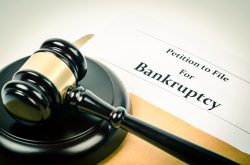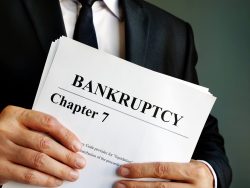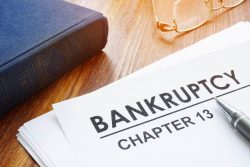Bankruptcy Lawyers in East Brunswick NJ
 The decision to file for personal bankruptcy is never an easy one, even with the number of bankruptcy applications on the rise due to the current economic situation in New Jersey and the rest of the country. At Cosner Law Group, we are here to explain your legal options and help you make the key decisions regarding whether bankruptcy is the right choice for you and which option best suits your needs.
The decision to file for personal bankruptcy is never an easy one, even with the number of bankruptcy applications on the rise due to the current economic situation in New Jersey and the rest of the country. At Cosner Law Group, we are here to explain your legal options and help you make the key decisions regarding whether bankruptcy is the right choice for you and which option best suits your needs.
Our solid reputation is why people from all over New Jersey and New York trust us when seeking counsel surrounding these delicate decisions. Our bankruptcy attorneys can help you navigate every step of the bankruptcy process with compassion and comprehensive guidance, not judgment.
Our education and experience further set our law firm apart from other legal practices when it comes to issues concerning tax and bankruptcy. Founding attorney Alan G. Cosner is a former IRS agent, an accountant and has a master’s degree in Tax from New York University. Firm attorneys can help you resolve these issues as smoothly as possible.
There are two kinds of bankruptcies that people can file: a Chapter 7 bankruptcy and a Chapter 13 bankruptcy. Firm attorneys can analyze your financial circumstances and advise which type of bankruptcy is appropriate for you.
Contact us today to schedule a free, confidential appointment to discuss your needs, financial circumstances and options.
Chapter 7 Bankruptcy Relief in New Jersey
Chapter 7 bankruptcy – sometimes referred to as a “straight liquidation” – gives you (the debtor) a fresh start. Generally, to qualify for chapter 7, you must satisfy two conditions: (i) you (or your household) make below a certain income level; and (ii) the value of your assets also is below a certain threshold.
bankruptcy – sometimes referred to as a “straight liquidation” – gives you (the debtor) a fresh start. Generally, to qualify for chapter 7, you must satisfy two conditions: (i) you (or your household) make below a certain income level; and (ii) the value of your assets also is below a certain threshold.
Chapter 7 bankruptcy provides a “fresh start” to individuals who qualify. Generally, when a chapter 7 bankruptcy is filed, creditors are required to stop efforts to collect a debt, actions to repossess property and proceedings to foreclose a mortgage without Court permission. The requirement that creditors cease all efforts to collect – known as the “automatic stay” – provides you with breathing room and allows you the opportunity to get back on your feet.
Chapter 7 bankruptcy also typically discharges your debts, including most kinds of medical bills and credit card debt. This discharge of debt is a core element of the “fresh start” given to debtors through a chapter 7 proceeding.
Certain debts, however, are “non-dischargeable” in chapter 7 bankruptcy. Examples of non-dischargeable debts include:
- Alimony and child support
- Debts for fraud, disposal of property used as security for a debt, embezzlement, larceny, malicious (intentional) injury to another person or their property and debts for credit obtained with a false financial statement (where you intentionally omitted debts from your credit application in order to obtain credit).
- Back taxes.
- Student loans due and owing for less than five years (unless extreme hardship is shown.)
- Fines or penalties imposed by government.
- Debts which you fail to list on your bankruptcy schedules.
There are many issues which can prevent a debt from being discharged, which is why it is critical to have one of our experienced lawyers on your side who can advocate on your behalf. Our goal is to use a Chapter 7 bankruptcy to help you get a fresh start by providing debt relief. Contact a Firm attorney today to discuss whether your debts potentially would be dischargeable in a chapter 7 bankruptcy.
If you have assets with financial value, the Court-appointed Chapter 7 bankruptcy trustee may have the right to take and sell those assets for the benefit of your creditors. Some property is “exempt” and may not be subject to sale in this fashion. Contact Cosner Law Group today to discuss which exemptions may be applicable to help protect your assets from being sold by the bankruptcy trustee for the benefit of your creditors.
The process of filing a Chapter 7 bankruptcy frequently is confusing and time consuming. With our knowledgeable attorneys on your side, we can make the process smoother and easier. Contact us today if you are contemplating filing Chapter 7 bankruptcy and have questions or need help with the process.
All of the attorneys in our firm can help you through every step of the process, including:
- Helping you enroll in mandatory credit counseling
- Assisting you in collecting all the documentation that has to be filed with the bankruptcy court including:
- List of all assets and liabilities
- Proof of current income and expenditures
- Statement of all financial affairs, including all bank accounts, retirement accounts, real estate holdings, etc.
- Schedule of executory contracts and unexpired leases
- Tax return for the most recent year and tax returns filed during the bankruptcy case proceeds
- Additional documentation if most of your debt is consumer based.
- Filing your completed petition with the requisite filings fees
- Making sure that once your petition has been filed that creditors adhere to the law and cease harassing you
- Petitioning for a home loan modification, provide foreclosure defense and attempt to negotiate a reaffirmation
- Facilitating the protection of certain assets as allowed under the Chapter 7 bankruptcy code
- Preparing you and representing you at the trustee hearing where decisions will be made about discharging your debt with your creditors
If we help you successfully obtain an unchallenged discharge, once you get back on your feet and are building your financial stability, we will be here to help you plan for the future to protect those assets with our elder law and estate planning services. Contact us today so we can start working with you to secure your financial future and freedom.
Chapter 13 Bankruptcy Relief in New Jersey
 A Chapter 13 Bankruptcy is designed for people who have some regular income over and above their current living expenses (for food, rent, clothing, utilities, etc.). Chapter 13 bankruptcies also frequently involve efforts to “save” homes from foreclosure proceedings in appropriate circumstances. Contact a Firm attorney today to determine whether a Chapter 13 bankruptcy would be appropriate for you.
A Chapter 13 Bankruptcy is designed for people who have some regular income over and above their current living expenses (for food, rent, clothing, utilities, etc.). Chapter 13 bankruptcies also frequently involve efforts to “save” homes from foreclosure proceedings in appropriate circumstances. Contact a Firm attorney today to determine whether a Chapter 13 bankruptcy would be appropriate for you.
Generally, in a Chapter 13 bankruptcy, you are allowed to “restructure” your debts and pay them back in an organized fashion over time. You do this by establishing a repayment plan – which can be three, four or five years– for your debts, and making regular payments under that plan to the Court-appointed trustee.
The amount that you pay back under a Chapter 13 plan depends on the individual facts and circumstances of your case. Generally, a “secured debt” – debt that has collateral, such as a mortgage or a car loan – is paid back 100% through a Chapter 13 repayment plan. “Unsecured debt” – for example, most credit card debt – may be paid back at less than 100% in a Chapter 13 bankruptcy. All remaining debts not paid through the plan are discharged, except for non-dischargeable debts such as alimony and child support.
Firm attorneys have the knowledge and experience to draft Chapter 13 repayment plans that provide you with the maximum legal financial benefit and allows you to pay back as little of your debt as is legally permissible.
SUMMARY
A Chapter 7 Bankruptcy can wipe out dischargeable debts and give you a fresh start. A Chapter 13 Bankruptcy allows you to repay your debts in an organized fashion under a repayment plan that you can afford. Contact the Firm today to schedule a free initial consultation with one of our experienced lawyers to determine whether a Chapter 7 or Chapter 13 bankruptcy is the right decision for you and your family.
















